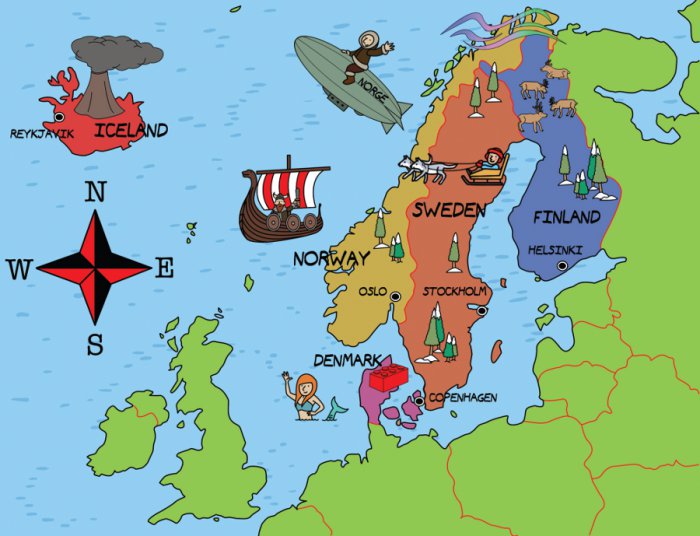Help

On the subject of English: anything between 80 – 90% of Scandinavians speak English, compared to Italy’s 10-20 % (I tried to find data on this, but and I kept seeing 30%. I’m not sure how the statistics were calculated, but I can tell you from personal experience that there’s no way 30% of Italians speak English)
TV /Movies
The biggest contributor to the success of Scandinavians in language learning is their consumption of English media. Scandinavians watch a lot of movies and TV series from America in English, whereas Italians dub almost everything from America into Italian. This is an important difference because it means that Scandinavians are not only exposed to English early on in their lives, but also regularly. The amount of exposure one has to a foreign languages usually correlates to one’s level of comprehension, ability to understand the language when spoken quickly and one’s ability to imitate sounds.
Education
Another factor for the success of Scandinavians is the the quality of education, which is extremely high. One difference I can point out between Scandinavia and Italy based on conversations with friends is that the Scandinavian education system gives higher importance to the integration of theory and practice. The Italian system, however, focuses primarily on theory. I trained as an electrical engineer at University and despite studying the theory of how circuit boards work I’ve never actually touched or worked with a circuit board to understand how it works in practice. You’re probably wondering how this is possible, so to clarify, it’s not necessary for an engineer to work with a circuit board physically as it’s the job of a technician. However the point I want to emphasize is that Scandinavian countries give greater importance to the combination of theory and practice than Italy, and I believe this is part of their success with languages.
Danish, Swedish and Norwegian are all Germanic languages, which is also the case for English. Learning a language which shares aspects of your native language, or a language you know well, makes the learning process easier. I mention this not to discount the achievements of Scandinavians but to point out a factor that’s often not taken into consideration by beginner learners. Difficulty of a foreign language is relative. There are many aspects to take into account such as syntax, pronunciation and vocabulary. You might be surprised to discover that there are at least 1558 Swedish words you already know If you know English.
When choosing a foreign foreign language to learn it’s important to be aware of how distant the language is to languages you already know.
We also have to acknowledge that It’s uncommon to find someone learning Swedish, Danish or Norwegian who isn’t from Scandinavia, and that their languages are only spoken in their countries, so there’s a need to learn a foreign language if they are to interact with the rest of the world.
There’s a lot to learn from the success Scandinavia has had with the English language. The most important being that the degree to which a foreign language is integrated into your life correlates with your ability to communicate in that language. The Media is a powerful tool used for communication and entertainment all over the world, so it’s extremely powerful for language learning. I use foreign media all the time to expand and maintain my knowledge and abilities. For example, I often read the German newspaper “ Der spiegel” before going to bed. This is a habit. The German language is part of my life, so improving is not something I have to make conscious effort to do anymore.
Integrate the language you’re learning into your everyday life, create a need to use it regularly, and place high importance on the combination of theory and practice. These are the reasons why Scandinavians speak exceptional English.
Related topics:
- Why must you learn from your mistakes when you study a new language?
- What are the 6 CEFR language levels?
- How do I use Russian cases?
- 5 Things I Wish I Had Known When I Began Learning Specific Languages
Comments
 2
2
 1
All
1
All
 | nico_nickmAugust 2021 Naja, man darf auch nicht vergessen, dass weite Teile von England über Jahrhunderte unter skandinavischer Herrschaft lagen. Da sollten schon die ein oder anderen sprachlichen Gemeinsamkeiten daraus resultieren ;) |
 English
English | dkowalewaMarch 2016 mówią świetnie po angielsku |
 English
English














































 Source: LUCA LAMPARIELLO
Source: LUCA LAMPARIELLO